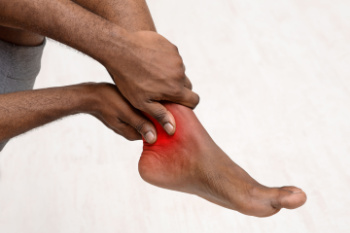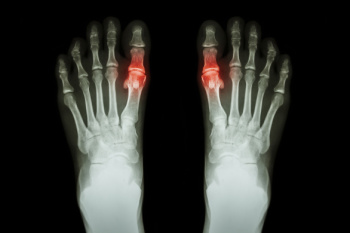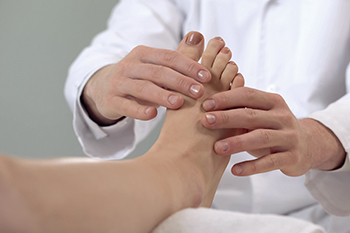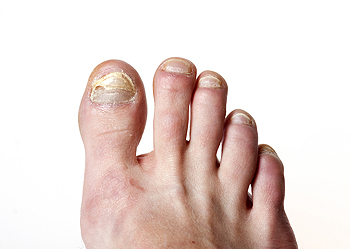Items filtered by date: May 2025
Common Causes of Ankle Injuries in Baseball

Ankle injuries are a frequent concern in baseball due to the dynamic and fast-paced nature of the game. Players often experience sprains or strains as a result of rapid direction changes and high-impact movements. Running at full speed and sliding into bases can place intense stress on the ankle joints, especially when contact with the base is awkward or mistimed. Uneven playing surfaces increase the risk of rolling the ankle during sprints or fielding. Quick lateral movements and sudden stops while fielding or chasing a ball also contribute to ankle strain. Additionally, stealing bases demands explosive acceleration and abrupt sliding, which can lead to twists or falls. If you have sustained a foot or ankle injury while playing baseball, it is suggested that you consult a podiatrist who can offer effective treatment solutions, allowing you to return to this popular sport as soon as possible.
Sports related foot and ankle injuries require proper treatment before players can go back to their regular routines. For more information, contact Mindy J. Trotter, DPM, CWSP of Georgia. Our doctor can provide the care you need to keep you pain-free and on your feet.
Sports Related Foot and Ankle Injuries
Foot and ankle injuries are a common occurrence when it comes to athletes of any sport. While many athletes dismiss the initial aches and pains, the truth is that ignoring potential foot and ankle injuries can lead to serious problems. As athletes continue to place pressure and strain the area further, a mild injury can turn into something as serious as a rupture and may lead to a permanent disability. There are many factors that contribute to sports related foot and ankle injuries, which include failure to warm up properly, not providing support or wearing bad footwear. Common injuries and conditions athletes face, including:
- Plantar Fasciitis
- Achilles Tendinitis
- Achilles Tendon Rupture
- Ankle Sprains
Sports related injuries are commonly treated using the RICE method. This includes rest, applying ice to the injured area, compression and elevating the ankle. More serious sprains and injuries may require surgery, which could include arthroscopic and reconstructive surgery. Rehabilitation and therapy may also be required in order to get any recovering athlete to become fully functional again. Any unusual aches and pains an athlete sustains must be evaluated by a licensed, reputable medical professional.
If you have any questions please feel free to contact our office located in Peachtree City and Newnan, GA . We offer the newest diagnostic and treatment technologies for all your foot and ankle needs.
Understanding Ankle Arthritis

Ankle arthritis happens when the cartilage in the joint wears down, causing pain, stiffness, and swelling. It can result from years of wear and tear, an old injury, or conditions like rheumatoid arthritis. The pain often feels worse in the morning or after standing or walking for long periods. The ankle may feel weak or unstable, making it hard to move normally. Treatment depends on the severity of the symptoms. Wearing supportive shoes, braces, and custom orthotics can help reduce strain. Anti-inflammatory medication may also offer relief. In advanced cases, injections or surgery might be needed to restore comfort and function. Early care can slow the progression and protect mobility. If you feel ongoing pain or stiffness in your ankle, it is suggested you see a podiatrist for a diagnosis and appropriate treatment.
Arthritis can be a difficult condition to live with. If you are seeking treatment, contact Mindy J. Trotter, DPM, CWSP from Georgia. Our doctor can provide the care you need to keep you pain-free and on your feet.
Arthritic Foot Care
Arthritis is a term that is commonly used to describe joint pain. The condition itself can occur to anyone of any age, race, or gender, and there are over 100 types of it. Nevertheless, arthritis is more commonly found in women compared to men, and it is also more prevalent in those who are overweight. The causes of arthritis vary depending on which type of arthritis you have. Osteoarthritis for example, is often caused by injury, while rheumatoid arthritis is caused by a misdirected immune system.
Symptoms
- Swelling
- Pain
- Stiffness
- Decreased Range of Motion
Arthritic symptoms range in severity, and they may come and go. Some symptoms stay the same for several years but could potentially get worse with time. Severe cases of arthritis can prevent its sufferers from performing daily activities and make walking difficult.
Risk Factors
- Occupation – Occupations requiring repetitive knee movements have been linked to osteoarthritis
- Obesity – Excess weight can contribute to osteoarthritis development
- Infection – Microbial agents can infect the joints and trigger arthritis
- Joint Injuries – Damage to joints may lead to osteoarthritis
- Age – Risk increases with age
- Gender –Most types are more common in women
- Genetics – Arthritis can be hereditary
If you suspect your arthritis is affecting your feet, it is crucial that you see a podiatrist immediately. Your doctor will be able to address your specific case and help you decide which treatment method is best for you.
If you have any questions, please feel free to contact our office located in Peachtree City and Newnan, GA . We offer the newest diagnostic and treatment technologies for all your foot care needs.
Facts About Gout

Gout is a form of inflammatory arthritis caused by a buildup of uric acid crystals in the joints. This condition often leads to sudden, intense pain, swelling, redness, and warmth, most commonly affecting the big toe. The pain can possibly cause difficulty in walking. Gout develops when the body either produces too much uric acid or fails to eliminate enough of it through the kidneys. Risk factors include a diet high in red meat, seafood, and sugary drinks, as well as excessive alcohol consumption. Being overweight or having certain health conditions, such as high blood pressure, diabetes, or kidney disease, can also increase the risk. Genetics can play a role, as well. If you have symptoms of gout, it is strongly suggested that you are under the care of a podiatrist who can accurately diagnose and manage this painful condition.
Gout is a painful condition that can be treated. If you are seeking treatment, contact Mindy J. Trotter, DPM, CWSP from Georgia. Our doctor will treat your foot and ankle needs.
What Is Gout?
Gout is a form of arthritis that is characterized by sudden, severe attacks of pain, redness, and tenderness in the joints. The condition usually affects the joint at the base of the big toe. A gout attack can occur at any random time, such as the middle of the night while you are asleep.
Symptoms
- Intense Joint Pain - Usually around the large joint of your big toe, and it most severe within the first four to twelve hours
- Lingering Discomfort - Joint discomfort may last from a few days to a few weeks
- Inflammation and Redness -Affected joints may become swollen, tender, warm and red
- Limited Range of Motion - May experience a decrease in joint mobility
Risk Factors
- Genetics - If family members have gout, you’re more likely to have it
- Medications - Diuretic medications can raise uric acid levels
- Gender/Age - Gout is more common in men until the age of 60. It is believed that estrogen protects women until that point
- Diet - Eating red meat and shellfish increases your risk
- Alcohol - Having more than two alcoholic drinks per day increases your risk
- Obesity - Obese people are at a higher risk for gout
Prior to visiting your podiatrist to receive treatment for gout, there are a few things you should do beforehand. If you have gout you should write down your symptoms--including when they started and how often you experience them, important medical information you may have, and any questions you may have. Writing down these three things will help your podiatrist in assessing your specific situation so that he or she may provide the best route of treatment for you.
If you have any questions, please feel free to contact our office located in Peachtree City and Newnan, GA . We offer the newest diagnostic and treatment technologies for all your foot care needs.
Struggling with wounds that just won’t heal?

Favor Foot Ankle Leg & Wound Care is proud to be New Jersey’s leader in advanced wound care. Our experienced team is dedicated to providing innovative and effective treatments for non-healing wounds - so you can start healing today!
See if advanced wound care is right for you - Request an appointment today!
Understanding Fungal Nail Infections

Fungal nail infections, or onychomycosis, often affect the toenails, causing them to become discolored, thickened, brittle, or misshapen. These infections are usually caused by fungi that thrive in warm, moist environments such as locker rooms, public showers, or inside sweaty shoes. They can also develop after a nail injury or if the immune system is compromised. Early symptoms may include white or yellow spots under the nail, changes in nail texture, and a foul odor. As the infection progresses, the nail may become painful, lift from the nail bed, or crumble at the edges. A podiatrist can diagnose the infection through a nail sample and offer a range of treatment options. These may include topical or oral antifungal medications, laser therapy, or, in some cases, removal of the infected nail. They can also help prevent reinfection through hygiene guidance and proper foot care. If you have a fungal nail infection, it is suggested that you schedule an appointment to see a podiatrist.
For more information about treatment, contact Mindy J. Trotter, DPM, CWSP of Georgia. Our doctor can provide the care you need to keep you pain-free and on your feet.
Toenail Fungus Treatment
Toenail fungus is a condition that affects many people and can be especially hard to get rid of. Fortunately, there are several methods to go about treating and avoiding it.
Antifungals & Deterrence
Oral antifungal medicine has been shown to be effective in many cases. It is important to consult with a podiatrist to determine the proper regiment for you, or potentially explore other options.
Applying foot powder on the feet and shoes helps keep the feet free of moisture and sweat.
Sandals or open toed shoes – Wearing these will allow air movement and help keep feet dry. They also expose your feet to light, which fungus cannot tolerate. Socks with moisture wicking material also help as well.
If you have any questions please feel free to contact our office located in Peachtree City and Newnan, GA . We offer the newest diagnostic tools and technology to treat your foot and ankle needs.
